US President’s Advisory Council on Doing Business in Africa visits Ethiopia, Kenya, Côte d’Ivoire, and Ghana
From June 24 to July 6, a delegation from the President’s Advisory Council on Doing Business in Africa (PAC-DBIA)—a group of 23 businesses tasked with advising the president on ways to promote U.S.-Africa trade and investment—completed a fact-finding mission to Ethiopia, Kenya, Côte d’Ivoire, and Ghana to collect information on opportunities to strengthen the U.S.-Africa commercial relationship. U.S. Secretary of Commerce Wilbur Ross, who headed the delegation in Ghana, commented on the significance of U.S.-Africa business ties before the trip began, stating, “President Trump and I firmly believe that American companies, working in conjunction with the African business community, will help African countries develop and, ultimately, take their rightful place within the international economic system.”
On the delegation’s first stop in Ethiopia, it met with the CEO of Ethiopian Airlines, Tewolde Gebremariam, who noted, “Ethiopian [Airlines] is the most significant source of U.S.-Ethiopia business relations. These relations cover the full spectrum of the commercial aviation sector, ranging from aircraft, engines, navigation to flight tracking systems.” During the visit, U.S. companies General Electric (GE) and Honeywell announced $934 million in new deals related to the procurement of engines and maintenance services, as well as auxiliary power unit services and airport security systems, with the airline. In Kenya, the PAC-DBIA delegation participated in an economic summit where U.S. and Kenyan firms and officials reached 12 deals amounting to approximately $100 million. These deals fell under the priority pillars of Kenyan President Uhuru Kenyatta’s Big Four Plan—the “Four” being food and nutrition, manufacturing, universal health care, and affordable housing—and include an agreement between the Kenyan Ministry of Health and a U.S. firm Medtronic to establish medical dialysis centers in Kenya.
Next, in Côte d’Ivoire, U.S. Millennium Challenge Corporation (MCC) Chief Operating Officer Jonathan Nash and African Development Bank Group Senior Vice President Charles Boamah announced that their two institutions would be deepening their partnership. In particular, they will collaborate on the MCC’s $375 million dollar compact in Benin’s energy sector as well as on opportunities to engage in regional investments in Africa—a new authority that the MCC gained through the “AGOA and MCA Modernization Act” that passed Congress in April 2018. Finally, in Ghana, the U.S. and Ghanaian governments signed a memorandum of understanding to promote public-private partnerships and investments in strategic sectors of Ghana’s “Beyond Aid” strategy, including infrastructure, energy, agriculture, health care, industry, financial services, and digital services. Deputy Minister for Information Kojo Oppong Nkrumah said of the MoU that direct discussions were ongoing between the two governments, and “we will now put some flesh to it and get some specifics outlined.”
31st African Union Summit marks progress on free trade while security challenges remain
On July 1-2, 22 African leaders met for the 31st summit of the African Union (AU) in Nouakchott, Mauritania. At the summit, South Africa joined more than 50 African states in signing the African Continental Free Trade Area (AfCFTA) agreement, which aims to create a single market for goods and services across the continent. Of the AfCFTA, Rwandan President Paul Kagame stated, it “is among the most historic achievements of the African Union.” In addition to the free trade agreement, security issues were discussed prominently, as a weekend attack in Mali by an al Qaida-linked group targeting French patrols killed four civilians and four French soldiers, highlighting ongoing security challenges in the Sahel. African heads of state made a commitment to improve coordination of their counterterrorism efforts, particularly in Nigeria and the Sahel region. French President Emmanuel Macron also made an appearance after news of the attacks on French citizens to discuss ways to combat Islamic extremism; he is expected to meet with the G5 Sahel force—the five-country anti-terror group comprised of Burkina Faso, Chad, Mali, Mauritania, and Niger—on the sidelines to work on these issues.
Nigeria updates: Procter & Gamble shuts down plant, French President Macron visits, and the ruling APC party splits
This week, American company Procter & Gamble announced that it would be shutting down its $300 million production plant located in southwest Nigeria, just one year after its launch. As a result, 120 employees will be laid off. The company cites that it has been struggling to break even due to an array of factors including the high cost of importing raw materials, partly due to government regulations. An official from the firm stated, “It is so expensive to import these raw materials which are not produced in Nigeria. Other companies take the shortcut by maneuvering the system, but we cannot.” Companies importing goods to Nigeria have faced a number of challenges, one of which includes currency shortages. Nigeria is presently asking businesses that import from China to use the yuan instead of the U.S. dollar in the aim of boosting liquidity. Using the yuan would loosen the reliance on the dollar, thus reducing the pressure on the dollar-naira exchange rate.
In other news, on Tuesday, French President Emmanuel Macron arrived in Abuja to meet with President Muhammadu Buhari in a targeted diplomatic effort to strengthen ties with English-speaking African countries. During their talks, the presidents discussed ways to intensify the battle against Islamist militants. Macron told reporters, “We have to increase the pressure and operations against jihadists. France will remain present in the Sahel as long as necessary.” The visit also involved a cultural component as Macron visited the Shrine, a Lagos night club founded in honor of Afrobeats legend Fela Kuti. He praised Nigeria’s cultural hub, calling Lagos “Africa’s Cultural Capital,” and stating, “It may be a surprise that a French president goes to the shrine, but it never surprises anyone if I go to the Albert Hall or the Met. We have to change that.” He also inaugurated the Alliance Française in Lagos, a cultural center that has locations across the world. This marks Macron’s eighth visit to Africa since becoming president in May 2017.
On another note, the country’s ruling party, the All Progressive Congress, has split into factions this week as a number of high-ranking members announced that they would be forming an independent group. This move will intensify the pressure on President Buhari who is seeking a second term next February and will face increased electoral competition as a result.
The Brookings Institution is committed to quality, independence, and impact.
We are supported by a diverse array of funders. In line with our values and policies, each Brookings publication represents the sole views of its author(s).

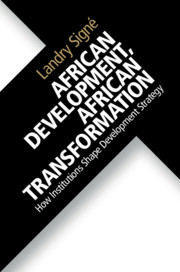
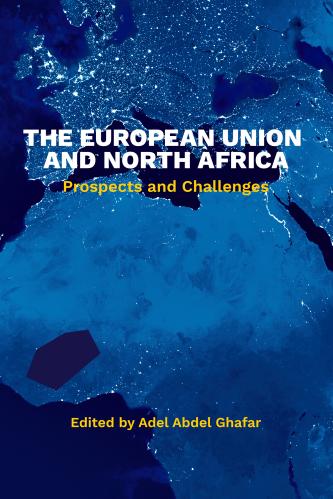
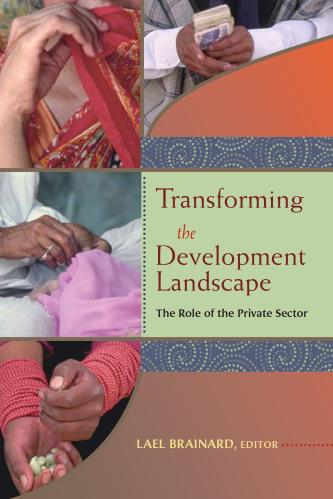
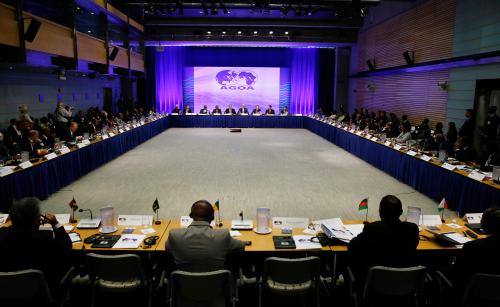
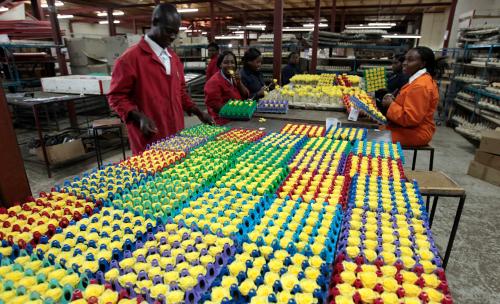
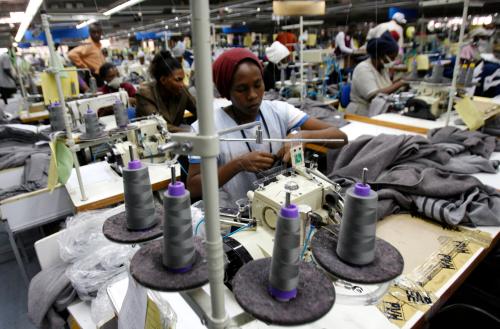



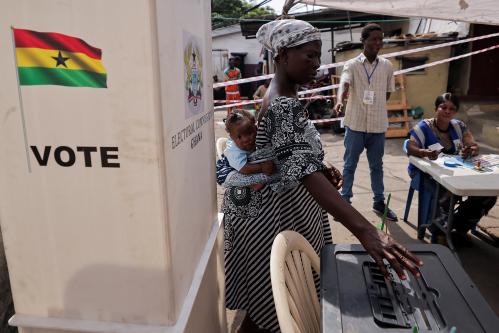
Commentary
Africa in the news: US-Africa business council, AU summit, and Nigeria updates
July 6, 2018